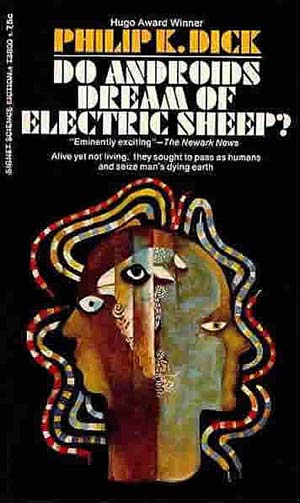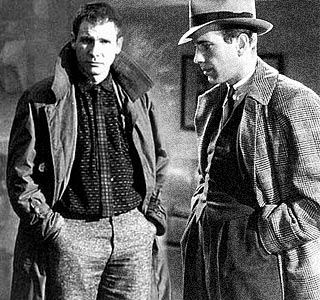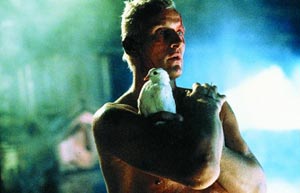Automata 101: Cyborgs and Androids – Part 2
Rhonda Knight is an Associate Professor of English at Coker College in Hartsville, SC. She teaches Medieval and Renaissance literature as well as composition courses. This blog will outline her experiences teaching an Honors English Composition course about created entities, beginning with the golem of Jewish legend and continuing through cyborgs, robots, androids, and artificial intelligence.
 I taught Philip K Dick’s Do Androids Dream of Electric Sheep? and Ridley Scott’s Blade Runner (1982) as a unit. I had not taught a PKD novel before, and I thought that his style would be a challenge for the students. Previously, I had taught some of his short stories (“The Hanging Stranger,” “Exhibit Piece,” “The Chromium Fence,” “We Can Remember It For You Wholesale,” “The Minority Report,” and “Paycheck”) in a science fiction class to mixed results. In that class, the students who were familiar with such shows as The Twilight Zone and The Outer Limits were able to see similarities between them and PKD’s stories. However, most of them did not have the historical understanding of 1950s and 1960s suburbia to grasp his deep satire of that life.
I taught Philip K Dick’s Do Androids Dream of Electric Sheep? and Ridley Scott’s Blade Runner (1982) as a unit. I had not taught a PKD novel before, and I thought that his style would be a challenge for the students. Previously, I had taught some of his short stories (“The Hanging Stranger,” “Exhibit Piece,” “The Chromium Fence,” “We Can Remember It For You Wholesale,” “The Minority Report,” and “Paycheck”) in a science fiction class to mixed results. In that class, the students who were familiar with such shows as The Twilight Zone and The Outer Limits were able to see similarities between them and PKD’s stories. However, most of them did not have the historical understanding of 1950s and 1960s suburbia to grasp his deep satire of that life.
Of course, much of Do Androids deals with the satire of that “Keeping Up with the Joneses” attitude we often connect with the suburban lifestyle. With a little bit of prompting, the students in my current class began to see the materialism of the society in Do Androids and were able to connect it to our culture. We talked about how in the cultural capital of Deckard’s world the status of owning a horse could equate to our status in owning smart phones, designer clothing and expensive cars. We talked about how the title Do Androids Dream of Electric Sheep? has multiple meanings that feed into that American Dream/”Keeping Up with the Joneses” attitude for both the humans and the androids in the text. The humans, represented by Deckard, are dreaming not of electric sheep but real ones. For the androids, owning an electric sheep would be a sign that they were successfully passing as humans. Therefore, they would not care if the sheep were electric or organic. The androids want the lives of the humans, but can they really achieve that type of lifestyle? Would the domestic lives of androids only be simulacra of humanity, minus feeling and empathy?
Given our discussion of the posthuman in He, She and It, much of our discussion centered on the ways that the humans exhibited posthuman qualities through the use of the Penfield mood organs and through the Mercer empathy boxes.  This was not where I planned for the conversation to go that day, so I was especially proud that the students were making connections between the readings and bringing them up. I will confess that none of us really understood Mercerism, but we feel that we all have a greater understanding of empathy. In preparation for teaching this book, I found a very interesting podcast by David Gill that helped me formulate some of my ideas. Later, I found an interview with Gill that was also helpful. One of Gill’s interesting insights in this interview is that “Scott wanted to talk about how great Androids could be. Dick wanted to talk about how crummy humans could be.”
This was not where I planned for the conversation to go that day, so I was especially proud that the students were making connections between the readings and bringing them up. I will confess that none of us really understood Mercerism, but we feel that we all have a greater understanding of empathy. In preparation for teaching this book, I found a very interesting podcast by David Gill that helped me formulate some of my ideas. Later, I found an interview with Gill that was also helpful. One of Gill’s interesting insights in this interview is that “Scott wanted to talk about how great Androids could be. Dick wanted to talk about how crummy humans could be.”
I planned the syllabus so that the students could watch Blade Runner while I was away at the Blackfriars Conference. Because of this, I started out training them to watch PKD as interpreted by Ridley Scott. Once I started teaching I realized that I could have spent a month just doing this. However, in my shorthand version, I tried to introduce the students quickly to hard-boiled detectives and film noir. I explained to them how Blade Runner interprets Do Androids through these two genres. In my opinion, Scott’s Deckard is the descendant of Philip Marlowe and Sam Spade—PKD’s Deckard, not so much. I showed the students the openings (15-30 minutes) of three movies, Laura (1944), Double Indemnity (1944), and L.A. Confidential (1997). I wanted them to see the noir visual characteristics of light and shadow as well as hear the typical hard-boiled, tough guy patter. If I had more time, I would have added The Big Sleep (1946) to really encapsulate the characteristics of the detective. I was able to show the students the first section of Blade Runner before I left for the conference. We were able to compare Scott’s use of smoke, light and shadow with the scenes that we watched in the other movies.
 The students finished most of the movie while I was away, and then we watched the ending when I returned. We discussed the ambiguous ending and the different characterizations of Deckard, Rachael, Pris and Roy. The students were very interested in the setting and were somewhat confused by the prevalence of Asian culture. I explained to them that Dick was a northern Californian and that Do Androids is set in San Francisco (they had missed the clues). At that point, someone made the connection to Chinatown, and they decided they liked Scott’s choice once they understood the reasons for it.
The students finished most of the movie while I was away, and then we watched the ending when I returned. We discussed the ambiguous ending and the different characterizations of Deckard, Rachael, Pris and Roy. The students were very interested in the setting and were somewhat confused by the prevalence of Asian culture. I explained to them that Dick was a northern Californian and that Do Androids is set in San Francisco (they had missed the clues). At that point, someone made the connection to Chinatown, and they decided they liked Scott’s choice once they understood the reasons for it.
I learned long ago that when teachers teach texts that they love too much they are bound to get their feelings hurt when the students don’t react the way they wish. I tried to protect myself with Blade Runner and observed some interesting things. First, in the students’ minds Blade Runner, Double Indemnity, and Metropolis are all “old movies.” They always react to the alterity of the movies first before they react to the narratives. They have a hard time either ignoring or embracing the strangeness of the form. Second, they were able to watch the movie without all of the 80s popular culture baggage that I experienced then and still experience now. For example, they have no sense of Darryl Hannah or Rutger Hauer outside that film, while these actors’ later success has always influenced my subsequent viewings of the movie. At one point I mentioned that the movie was released on the tail of Harrison Ford’s success as Han Solo and Indiana Jones. A student said “Oh, that’s who he is. I thought he looked familiar.” All I could do was shrug. In a way, this lack of knowledge gave them a purer viewing experience than I could ever have. Third, the students preferred the movie to the book but were not always able to articulate why. With prodding, they figured out that the sex between Rachael and Deckard was off-putting in the book but not in the movie because in the movie there was a hope that the catalyst was romance not ego or manipulation.  They also liked Deckard better in the movie because he seems stronger. I explained to them that their expectations had been programmed by the hard-boiled detective even though they have never seen a Humphrey Bogart movie and don’t know who he is (really, they don’t). They missed the gadgets in the movie but not Mercerism. They were also surprised that mankind’s relationship with animals was such a footnote in the movie since it was so important in the book.
They also liked Deckard better in the movie because he seems stronger. I explained to them that their expectations had been programmed by the hard-boiled detective even though they have never seen a Humphrey Bogart movie and don’t know who he is (really, they don’t). They missed the gadgets in the movie but not Mercerism. They were also surprised that mankind’s relationship with animals was such a footnote in the movie since it was so important in the book.
All in all, this was a successful section, but it has made me think about PKD even more. I’ve not read many of his novels, only The Man in the High Castle besides Do Androids, but I have been following Charles Dee Mitchell’s blog on this site, and it is helping me decide which books I might want to read (and the ones that I don’t).



















 Full Details
Full Details


6 Comments
Loved the book, loved the movie and would have loved to be in this class! Did you discuss the possibility/probability that Deckard was a replicant in the film version? It’s left intentionally ambiguous in the film and makes for some fun conversation.
Really enjoyed this! Thanks.
…and do you have a blog?
@Dave, we did not talk about that too much. When we talked about the ambiguity in the ending of the movie, I mentioned that there was a theory about Deckard. That’s part of the problem of my not being there when the students watched most of the movie. If I’d have been there, I would have probably paused to show them the clues. @Tania, Thank you. I don’t have a blog, but after I end this series, I might as the WWE guys if I can start another series (unfortunately, the subject will not be about a class I’m teaching, unless everyone wants to learn more about Shakespeare!)
@Rhonda: Another series? Yes, please!
Rhonda, as a theatre graduate – I’m all for hearing about your classes on Shakespeare!! Probably not the scope of this blog though. I really enjoyed your writing. Aside from your discussion of the "themes" (which I might or might not have missed myself), I loved hearing about how the young students related to the themes and cultural references (and if they couldn’t relate, how you brought the theme to their own experiences). He, She, It is one of my all time favourite sci-fi novels too. I was thrilled to see that you used that in your class.
Sorry, the comment form is closed at this time.